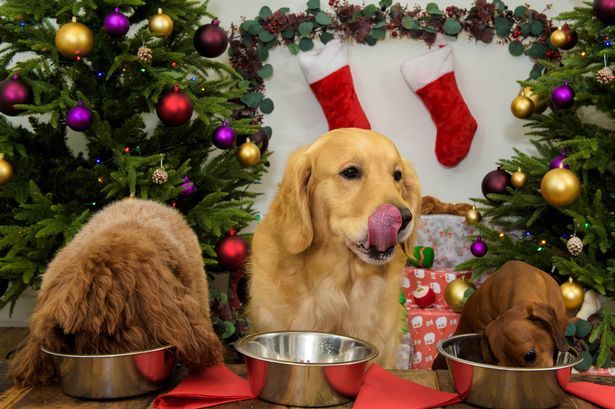Christmas is just around the corner and we are so excited. Everyone loves sharing the festive joy with their pets, especially around this time. There are also cheeky pets who love to sneak treats here and there. This increase in different 'Human' foods can cause them to develop pancreatitis.
What is pancreatitis?
The pancreas is a vital organ found on the right side of the abdomen. It has two functions:
1. To produce enzymes which help in digestion of food and,
2. To produce hormones, such as insulin.
When the pancreas becomes inflamed, the disorder is called pancreatitis. It is a disease process that is seen commonly in dogs. Acute pancreatitis is a sudden onset of pancreatic inflammation. The associated inflammation allows digestive enzymes to spill into the abdominal cavity. This may result in secondary damage to surrounding organs, such as the liver, bile ducts, gall bladder, and intestines.
What are the causes of pancreatitis?
Multiple factors can contribute to the development of pancreatitis in dogs:
• Nutrition: Dogs with diets high in fat, dogs who have recently gotten into the trash or have been fed table scraps, or dogs who 'steal' or are fed greasy 'people food' have a higher incidence of the disease
• Obese and overweight dogs appear to be more at risk
• Genetics may play a role, with Schnauzers and Yorkshire terriers appearing to be more prone to pancreatitis
• Previous pancreatitis
• Certain medications
• Metabolic disorders including hyperlipidemia (high amounts of lipid in the blood) and hypercalcemia (high amounts of calcium in the blood)
• Hormonal diseases such as Cushing's disease (hyperadrenocorticism), hypothyroidism, and diabetes mellitus
• Abdominal surgery, trauma to the abdomen (e.g., hit by a car), shock, or other conditions that could affect blood flow to the pancreas
What are the symptoms of pancreatitis?
The symptoms of pancreatitis are similar to those of other diseases and can range from mild to very severe. Symptoms can include; a very painful abdomen, abdominal distention, lack of appetite, depression, dehydration, a 'hunched up' posture, vomiting, and perhaps diarrhea. Fever often accompanies these symptoms.
Animals with a more severe case can develop heart arrhythmias, sepsis (body-wide infection), difficulty breathing, and a life-threatening condition called disseminated intravascular coagulation (DIC), which results in multiple hemorrhages. If the inflammation is severe, organs surrounding the pancreas could be 'autodigested' by pancreatic enzymes released from the damaged pancreas and become permanently damaged.
How is pancreatitis diagnosed?
To diagnose pancreatitis other causes of the symptoms must be ruled out first.
• A complete history
• thorough physical exam
• complete blood count, chemistry panel and urinalysis are performed. Blood levels of two pancreatic enzymes, amylase and lipase, may be obtained.
• CPLI (canine pancreatic lipase immunoreactivity) SNAP test is another diagnostic tool that can be done in-house and if positive, a sample can be sent to the lab for quantification.
• radiography (x-rays) and ultrasound can also help diagnosis.
• biopsy can result in a conclusive diagnosis but is not commonly performed.
How is pancreatitis treated?
The goals of treatment are to:
• Correct dehydration
• Provide pain relief
• Control vomiting
• Provide nutritional support
• Prevent complications
Dehydration and electrolyte imbalances are common in dogs with acute pancreatitis, so supplemental fluids are given either via subcutaneous or intravenous route; depending upon the severity of the condition.
Pain relief and anti-nausea medications are administered to aid in recovery. If vomiting is severe, food, water, and oral medications are withheld for at least 24 hours. Depending upon the dog's response, food intake can be started again after a day or more. Meals are generally small, bland, easily digestible, high-carbohydrate, low-fat food.
What is the prognosis for dogs with pancreatitis?
Pancreatitis can be a very unpredictable disease. In most cases, if the pancreatitis was mild and the pet only had one episode, chances of recovery are good and keeping the dog on a low-fat diet may be all that is necessary to prevent recurrence or complications. In other cases, what appears to be a mild case may progress, or might be treated successfully only to have recurrences, sometimes severe.
Some animals develop chronic pancreatitis, which can lead to diabetes mellitus and/or pancreatic insufficiency, also called 'maldigestion syndrome.'
Home care and Prevention
It may take your dog several days up to a couple of weeks to recover completely. Some dogs will have a reduced appetite, diarrhea or soft faeces but, both issues should improve each day. Diet is essential in recovery and preventing further bouts of pancreatitis. Avoiding fatty food especially, ‘human food’ such as meat scraps, sausages etc. is essential. Once dogs have had pancreatitis, they are more vulnerable to having it again. There are specialised diets that can bed fed reduce the risk of recurrences.
We wish everyone a Merry Christmas and a Happy New Year and encourage all to keep an eye on their pets and what they are eating over the festive period. If you are concerned about the health of your pet over the Christmas period, one of our vets will be available 24/7 to help with any emergencies.
